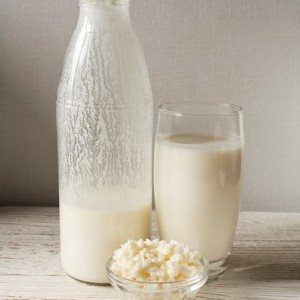Metagenomics for foodies
 Kefir is a viscous, sour-tasting, slightly alcoholic, milk-based beverage that’s been consumed for centuries. It’s made by adding a starter mix of bacteria and yeast – called the kefir “grain” – to pasteurized cow milk, though brewers have reported success with milk from goats, sheep, buffalo, and soy. As fermented dairy products go, it still lags behind yogurt and cheese in popularity, but in recent years kefir has enjoyed a surge in global sales.
Kefir is a viscous, sour-tasting, slightly alcoholic, milk-based beverage that’s been consumed for centuries. It’s made by adding a starter mix of bacteria and yeast – called the kefir “grain” – to pasteurized cow milk, though brewers have reported success with milk from goats, sheep, buffalo, and soy. As fermented dairy products go, it still lags behind yogurt and cheese in popularity, but in recent years kefir has enjoyed a surge in global sales.
That rise may be due, in part, to its reputed health benefits. For more than 100 years, scientists have suspected that the bacteria in fermented dairy products can improve intestinal health. More recently, articles and some studies have reported a wide spectrum of positive attributes — that it helps lower cholesterol, prevent cancer, reduce inflammation, and treat ulcerative colitis. Paul Cotter, a microbiologist at the Teagasc Food Research Centre in Cork, Ireland, has been studying kefir for several years. He says those broad claims haven’t been rigorously tested.
“When you claim something has compounds that can do everything, it becomes suspicious,” says Cotter. “Kefir’s benefits haven’t really been studied in a scientifically rigorous manner.” Most of the studies behind kefir’s extraordinary health claims derived from experiments on cell lines or animal models.
Read more at Metagenomics for Foodies, published by the the American Society for Microbiology. Image credit: ASM